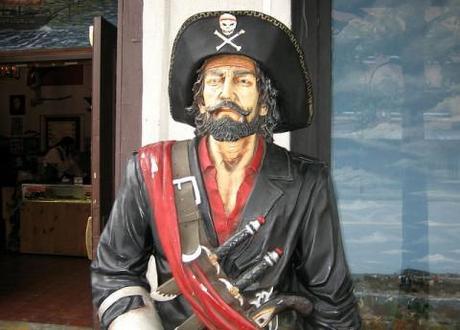
Is the issue of internet piracy getting lost in the SOPA debate? Photo credit: Fuzzcat via Flickr.
As the English-speaking world adjusts to 24 hours without Wikipedia, some commentators have started questioning the popular site’s protest. The online encyclopedia has gone dark for a day, along with other sites including Reddit and Boing Boing, to draw attention to proposed US legislation that critics say amounts to internet censorship. The disputed bills are the Stop Online Piracy Act (SOPA) in the U.S. House of Representatives, and PROTECTIP (PIPA) in the U.S. Senate.
According to The Guardian, the idea behind SOPA and PIPA is to “make it easier for copyright holders and the US government to cut off access to websites accused of containing illegal films, music and TV programming”. The bills are the result of years of lobbying by major content providers from music, media and film. However, opponents argued that the bills are too wide-ranging and could threaten free speech on the internet, as well as leading to websites being shut down unfairly.
A Wikipedia statement said: “SOPA and PIPA are badly drafted legislation that won’t be effective at their stated goal (to stop copyright infringement), and will cause serious damage to the free and open Internet.” But as the web rallies against SOPA, what’s the other side of the argument?
Different views of regulation. The two different sides of the SOPA debate have “fundamentally different views of how much the internet should be regulated”, wrote David Gelles in The Financial Times. Gelles reported that content creators believe current legislation is inadequate against internet piracy and that “new laws would provide essential checks for the internet where illicit versions of their content circulate freely”.
Some Wikipedia volunteer editors have questioned founder Jimmy Wales’s decision to join the online blackout protest against SOPA: “Some likened the site’s decision to fighting censorship with censorship,” reported Peter Svensson for the Associated Press.
Need to protect content. “While SOPA may veer too close to censorship for comfort, some content creators say it’s still an improvement over current protections,” wrote Olga Khazan in The Washington Post. Khazan spoke to small business owners who have been affected by internet piracy; Brian Dunlap, owner of a digital media firm, told the paper that the debate has become so polarised that the problem of copyright infringement is being overlooked: “What’s getting lost is that the protections we have now are inadequate. We’re very frustrated that opponents are guiding the dialog.” Khazan pointed out that small businesses are particularly badly hit by piracy: “Trade groups like the International Federation of the Phonographic Industry attribute job losses and fewer breakthrough artists to digital piracy.”
Time for change. “The anti-SOPA protests show just how Silicon Valley, the world’s stroppiest teenager, refuses to grow up. It’s a war they like fighting too much to stop,” wrote Andrew Orlowski for The Telegraph. Orlowski conceded that SOPA is too broad, but argued that the only reason the bills exist is because the tech world refuses to take responsibility for piracy, making voluntary agreements impossible: “The Googles and Facebooks have never seen an enforcement measure they like – when you ask them, they go awfully quiet. So we get enforcement measures nobody really likes.”
Online activist collective Anonymous has posted the personal details of media executives who support SOPA and “encouraged users to bombard the company and its executives with e-mails, faxes and phone calls”, according to The New York Times Media Decoder blog. The protest is called “Operation Hiroshima”.
Protest lacks big players. Apart from Wikipedia and Reddit, none of the major sites has joined the blackout, pointed out in The Christian Science Monitor: “The companies are not prepared to sacrifice a day’s worth of revenue and risk the ire of users for a protest whose impact on lawmakers is hard to gauge.”

